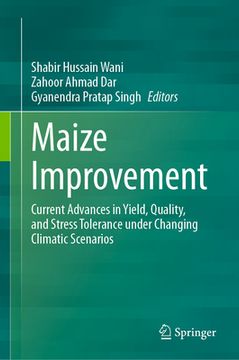Maize Improvement: Current Advances in Yield, Quality, and Stress Tolerance Under Changing Climatic Scenarios
Synopsis "Maize Improvement: Current Advances in Yield, Quality, and Stress Tolerance Under Changing Climatic Scenarios"
Maize is one of the most generally grown cereal crops at global level, followed by wheat and rice. Maize is the major crop in China both in terms of yield and acreage. In 2012, worldwide maize production was about 840 million tons. Maize has long been a staple food of most of the global population (particularly in South America and Africa) and a key nutrient resource for animal feed and for food industrial materials. Maize belts vary from the latitude 58 north to the latitude 40 south, and maize ripens every month of the year. Abiotic and biotic stresses are common in maize belts worldwide. Abiotic stresses (chiefly drought, salinity, and extreme temperatures), together with biotic stresses (primarily fungi, viruses, and pests), negatively affect maize growth, development, production and productivity. In the recent past, intense droughts, waterlogging, and extreme temperatures have relentlessly affected maize growth and yield. In China, 60% of the maize planting area is prone to drought, and the resultant yield loss is 20%-30% per year; in India, 25%-30% of the maize yield is lost as a result of waterlogging each year. The biotic stresses on maize are chiefly pathogens (fungal, bacterial, and viral), and the consequential syndromes, like ear/stalk rot, rough dwarf disease, and northern leaf blight, are widespread and result in grave damage. Roughly 10% of the global maize yield is lost each year as a result of biotic stresses. For example, the European corn borer [ECB, Ostrinianubilalis (Hübner)] causes yield losses of up to 2000 million dollars annually in the USA alone in the northern regions of China, the maize yield loss reaches 50% during years when maize badly affected by northern leaf blight. In addition, abiotic and biotic stresses time and again are present at the same time and rigorously influence maize production. To fulfill requirements of each maize-growing situation and to tackle the above mentions stresses in an effective way sensibly designed multidisciplinary strategy for developing suitable varieties for each of these stresses has been attempted during the last decade. Genomics is a field of supreme significance for elucidating the genetic architecture of complex quantitative traits and characterizing germplasm collections to achieve precise and specific manipulation of desirable alleles/genes. Advances in genotyping technologies and high throughput phenomics approaches have resulted in accelerated crop improvement like genomic selection, speed breeding, particularly in maize. Molecular breeding tools like collaborating all omics, has led to the development of maize genotypes having higher yields, improved quality and resilience to biotic and abiotic stresses. Through this book, we bring into one volume the various important aspects of maize improvement and the recent technological advances in development of maize genotypes with high yield, high quality and resilience to biotic and abiotic stresses

